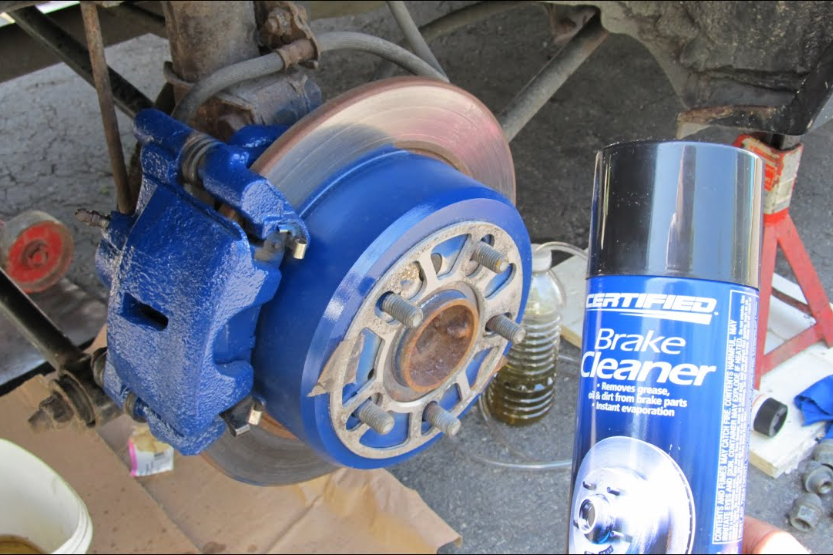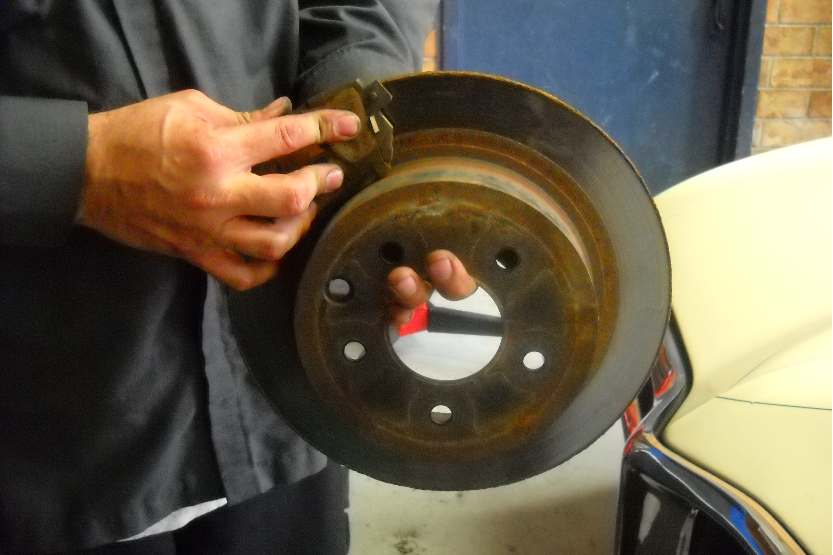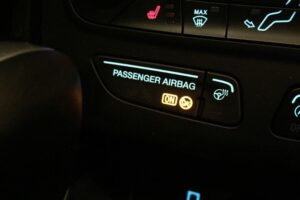When it comes to driving, safety should always be a top priority. Brakes are one of the most important safety features in a vehicle, and any issues with the braking system can be a cause for concern.
One issue that drivers may encounter is a brake pedal that goes all the way to the floor. This can be a scary and dangerous situation, as it can make it difficult to stop the vehicle in a timely manner.
One possible cause of a brake pedal going to the floor is a malfunctioning ABS system. ABS stands for Anti-Lock Braking System, and it is designed to prevent the wheels from locking up during hard braking.
When the ABS system is activated, the driver may feel a pulsing sensation in the brake pedal. However, if there is a problem with the ABS system, it can cause the brake pedal to go all the way to the floor.
This can be caused by a variety of issues, such as a malfunctioning ABS pump or contaminated sensors.
Can ABS Cause Brake Pedal to Go to the Floor?

The brake pedal going to the floor is a serious issue that can put the driver and passengers in danger.
The anti-lock braking system (ABS) is a safety feature that helps prevent the wheels from locking up while braking, allowing the driver to maintain control of the vehicle. However, in some cases, the ABS can cause the brake pedal to go to the floor.
One reason for this is a malfunctioning wheel speed sensor. The ABS relies on the wheel speed sensors to determine when a wheel is about to lock up.
If one or more of the sensors are malfunctioning, the ABS may activate and cause the brake pedal to go to the floor. In this case, the driver may feel a pulsing or vibrating sensation in the brake pedal.
Another reason for the brake pedal going to the floor is a malfunctioning ABS control module. The control module is responsible for interpreting the signals from the wheel speed sensors and activating the ABS when necessary.
If the control module is malfunctioning, it may activate the ABS when it is not needed, causing the brake pedal to go to the floor.
It is important to note that other issues can also cause the brake pedal to go to the floor, such as a leak in the brake system or low brake fluid. Therefore, it is important to have the vehicle inspected by a qualified mechanic to determine the exact cause of the issue.
In summary, while the ABS is a crucial safety feature, it can also cause the brake pedal to go to the floor in certain situations. Malfunctioning wheel speed sensors or a faulty ABS control module can activate the ABS when it is not needed, causing the brake pedal to go to the floor.
It is important to have the vehicle inspected by a qualified mechanic to determine the exact cause of the issue and ensure the safety of the driver and passengers.
Common Causes of Brake Pedal Sinking to Floor
When experiencing a sinking brake pedal, there are several potential causes that drivers should be aware of. Here are some of the most common issues that can cause a sinking brake pedal:
Brake Fluid Issues
One of the most common causes of a sinking brake pedal is a lack of brake fluid in the system. A low brake fluid level can be caused by a brake fluid leak or natural attrition.
If the brake fluid level remains low, it can cause a decrease in braking system pressure and cause the braking ability to diminish or disappear. Drivers should regularly check the brake fluid level in the brake fluid reservoir to ensure it is at the correct level.
Master Cylinder Faults
Another cause of a sinking brake pedal is a faulty master cylinder. The master cylinder is responsible for generating the internal pressure that is used to apply the brakes.
If the master cylinder is bad, it can cause a loss of pressure and a sinking brake pedal. Drivers should have their master cylinder inspected regularly to ensure it is functioning properly.
Brake Line and Hose Leaks
A brake line or hose leak can also cause a sinking brake pedal. If there is a leak in the brake line or hose, it can cause a loss of pressure in the braking system, leading to a sinking brake pedal.
Drivers should inspect their brake lines and hoses for any signs of leaks or damage and have them repaired or replaced as needed.
ABS Module Failures
In vehicles equipped with an anti-lock braking system (ABS), a failure of the ABS module can cause a sinking brake pedal. The ABS module is responsible for controlling the pressure in the braking system to prevent the wheels from locking up during hard braking.
If the ABS module fails, it can cause a loss of pressure in the braking system, leading to a sinking brake pedal.
Brake Pad and Caliper Issues
Worn brake pads or a malfunctioning brake caliper can also cause a sinking brake pedal. If the brake pads are worn, they will not be able to provide enough friction to slow the vehicle down effectively.
A malfunctioning brake caliper can also cause a loss of pressure in the braking system, leading to a sinking brake pedal. Drivers should have their brake pads and calipers inspected regularly to ensure they are functioning properly.
Wheel Cylinder and Drum Problems
In vehicles with drum brakes, a malfunctioning wheel cylinder or drum can cause a sinking brake pedal.
The wheel cylinder is responsible for applying the brake shoes to the drum, and if it is malfunctioning, it can cause a loss of pressure in the braking system, leading to a sinking brake pedal.
Drivers should have their wheel cylinders and drums inspected regularly to ensure they are functioning properly.
In conclusion, a sinking brake pedal can be caused by several issues, including brake fluid issues, master cylinder faults, brake line and hose leaks, ABS module failures, brake pad and caliper issues, and wheel cylinder and drum problems.
Drivers should have their brakes inspected regularly to ensure they are functioning properly and address any issues as soon as possible to ensure their safety on the road.
Diagnosing and Fixing the Problem

If you experience a brake pedal that goes to the floor, it is essential to diagnose and fix the problem as soon as possible to avoid brake failure and potential accidents. Here are some steps to help you troubleshoot and repair the issue:
Checking Fluid Levels and Leaks
The first step is to check the brake fluid level in the brake fluid reservoir. A low brake fluid level can cause the brake pedal to go to the floor. If the brake fluid level is low, it is crucial to inspect the brake system for leaks.
Brake system leaks can occur due to worn seals, brake hose, brake lines, or corroded brake rotors. If there is a leak, it is necessary to repair or replace the damaged components.
Inspecting and Replacing the Master Cylinder
The master cylinder is responsible for creating hydraulic pressure in the brake system. If the master cylinder fails, it can cause the brake pedal to go to the floor.
It is essential to inspect the master cylinder for internal damage or corrosion. If there is any damage, it is necessary to replace the master cylinder.
Bleeding the Brake System
Air bubbles in the brake system can cause the brake pedal to go to the floor. Bleeding the brake system can remove air bubbles and restore proper brake pressure. To bleed the brake system, start with the brake farthest from the master cylinder and work your way to the closest.
Repairing or Replacing ABS Module
If the ABS system fails, it can cause the brake pedal to go to the floor. ABS module failure can occur due to wiring issues, internal damage, or corrosion. If the ABS module is faulty, it is necessary to repair or replace the module.
Replacing Brake Pads and Calipers
Worn brake pads or faulty brake calipers can cause the brake pedal to go to the floor. It is essential to inspect the brake pads and calipers for wear and damage. If the brake pads or calipers are worn or faulty, it is necessary to replace them.
Addressing Wheel Cylinder and Drum Issues
If you have drum brakes, the wheel cylinders and brake shoes can cause the brake pedal to go to the floor. It is essential to inspect the wheel cylinders and brake shoes for wear and damage. If there is any damage, it is necessary to replace the wheel cylinders and brake shoes.
In conclusion, a brake pedal that goes to the floor is a serious issue that requires immediate attention. By following these steps, you can diagnose and fix the problem to restore proper brake pressure and ensure your safety on the road.
Preventive Measures and Maintenance Tips

Preventive measures and regular maintenance are crucial to ensure the proper functioning of the braking system and avoid brake pedal going to the floor. Here are some tips to keep in mind:
- Regular Brake System Inspection: Regular inspection of the brake system is important to identify any potential issues before they become a major problem. This includes checking the brake fluid level, brake pads, rotors, brake lines, and the brake master cylinder for any signs of wear or damage.
- Check Brake Fluid Level: The brake fluid level should be checked regularly and topped up if necessary. Low brake fluid can cause a decrease in braking system pressure and result in brake pedal going to the floor. If the brake fluid level remains low, it can cause the entire braking system to fail.
- Fixing Brake Fluid Leaks: Any brake fluid leaks should be fixed immediately to prevent low brake fluid levels. Brake fluid leaks can be identified by checking for wet spots under the vehicle or by inspecting the brake lines, brake hoses, and brake calipers for signs of corrosion or damage.
- Replace Brake Pads and Rotors: Brake pads and rotors should be replaced when they are worn out or damaged. Worn brake pads can cause the brake pedal to feel soft or spongy, while worn rotors can cause vibrations or noises while braking.
- Maintain ABS System: The ABS system should be maintained properly to ensure it is functioning correctly. This includes checking the ABS warning light, inspecting the ABS module, solenoids, and valves for any signs of damage or corrosion, and checking the wiring and connections to ensure they are secure.
- Use Tires with Good Traction: Tires with good traction are important for maintaining control of the vehicle and preventing the wheels from locking up while braking. This is especially important for vehicles equipped with ABS.
- Avoid Emergency Braking: Emergency braking should be avoided whenever possible as it can cause excessive wear on the brake system and lead to brake failure. Instead, slow down gradually and maintain a safe following distance to prevent sudden stops.
Alright, so here’s the deal, and take it from me as a mechanic: if you want your brakes to be in tip-top shape, it’s all about following these simple steps and giving them some regular TLC.
This way, you’ll avoid that scary brake pedal going all the way to the floor, keep your stopping power, and stay in control of your ride. Easy-peasy!
To Sum Up
In conclusion, it is possible for ABS to cause the brake pedal to go to the floor. This can happen when the system is unable to maintain the necessary hydraulic pressure to function, resulting in a loss of braking capacity.
There are several reasons why the brake pedal may go to the floor, including a lack of brake fluid, brake system leaks, and bad ABS sensors.
It is important to regularly check the brake fluid level and have any leaks or sensor issues addressed promptly to ensure the safety of the vehicle and its occupants.
Drivers should also be aware of the potential for ABS to cause the brake pedal to go to the floor and take appropriate action if this occurs. This may include releasing the brake pedal and reapplying it with less force, or pumping the brake pedal to try to build up hydraulic pressure.
Overall, understanding the potential causes of a brake pedal going to the floor and taking proactive measures to address any issues can help ensure the safe operation of a vehicle.





![ABS Light Comes On [Why Is It On and How to Turn It Off] abs light comes on](https://roadsumo.com/wp-content/uploads/2022/08/abs-light-comes-on-150x150.jpeg)


![Read more about the article Brake Lights Won’t Turn Off [Causes and How to Fix]](https://roadsumo.com/wp-content/uploads/2021/05/brake-lights-wont-turn-off-300x200.jpg)
